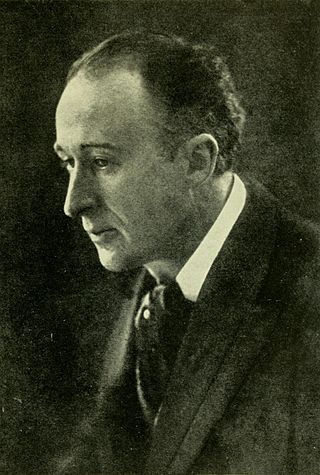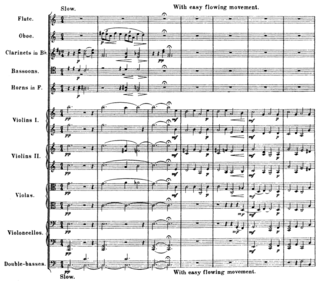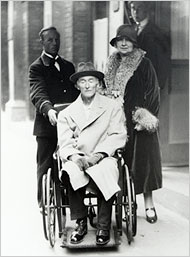Related Research Articles

Edvard Hagerup Grieg was a Norwegian composer and pianist. He is widely considered one of the leading Romantic era composers, and his music is part of the standard classical repertoire worldwide. His use of Norwegian folk music in his own compositions brought the music of Norway to fame, as well as helping to develop a national identity, much as Jean Sibelius did in Finland and Bedřich Smetana in Bohemia.

Frederick Theodore Albert Delius was an English composer. Born in Bradford in the north of England to a prosperous mercantile family, he resisted attempts to recruit him to commerce. He was sent to Florida in the United States in 1884 to manage an orange plantation. He soon neglected his managerial duties, and in 1886 returned to Europe.

Percy Aldridge Grainger was an Australian-born composer, arranger and pianist who moved to the United States in 1914 and became an American citizen in 1918. In the course of a long and innovative career he played a prominent role in the revival of interest in British folk music in the early years of the 20th century. Although much of his work was experimental and unusual, the piece with which he is most generally associated is his piano arrangement of the folk-dance tune "Country Gardens".

Philip Arnold Heseltine, known by the pseudonym Peter Warlock, was a British composer and music critic. The Warlock name, which reflects Heseltine's interest in occult practices, was used for all his published musical works. He is best known as a composer of songs and other vocal music; he also achieved notoriety in his lifetime through his unconventional and often scandalous lifestyle.

William Sharp was a Scottish writer, of poetry and literary biography in particular, who from 1893 wrote also as Fiona Macleod, a pseudonym kept almost secret during his lifetime. He was also an editor of the poetry of Ossian, Walter Scott, Matthew Arnold, Algernon Charles Swinburne and Eugene Lee-Hamilton.
David Matthias Lloyd-Jones was a British conductor who specialised in British and Russian music. In 1978 he was a co-founder of Opera North, conducting 50 productions during the 12 years he was there, and was also an editor and translator, especially of Russian operas.

On Hearing the First Cuckoo in Spring is a tone poem composed in 1912 by Frederick Delius. Together with Summer Night on the River it is one of Delius's Two Pieces for Small Orchestra. The two were first performed in Leipzig on 23 October 1913, conducted by Arthur Nikisch. On Hearing the First Cuckoo in Spring is the longer of the two pieces, with a typical playing time of between six and seven minutes. There have been numerous recordings of the piece, which Delius's champion Sir Thomas Beecham described as much the best known of the composer's works.
Paris: The Song of a Great City is a nocturne for orchestra composed by Frederick Delius over the period of 1899–1900. Hans Haym, to whom Delius dedicated the work, conducted the premiere on 14 December 1901 in Elberfeld, Germany. Sir Thomas Beecham conducted the UK premiere of the work in Liverpool on 11 January 1908. The critical edition of the score, published in the late 1980s, incorporated revisions by Beecham, and included editorial work from Eric Fenby and Norman Del Mar.

Hélène Sophie Emilie Rosen, later known as Jelka Delius, was a German painter, best known as the wife of the English composer Frederick Delius.

August Johannes Jaeger was an Anglo-German music publisher, who developed a close friendship with the English composer Edward Elgar. He offered advice and help to Elgar and is immortalised in the Enigma Variations.
Sea Drift is among the larger-scale musical works by the composer Frederick Delius. Completed in 1903–04 and first performed in 1906, it is a setting for baritone, chorus and orchestra of words by Walt Whitman.
Edward Avery was an English publisher of pornography. His notable publications include The Whippingham Papers, including poems by Algernon Charles Swinburne, and a pirated edition of Sir Richard Burton's Kama Sutra. He was an associate of William Lazenby and Leonard Smithers.

Louis Plaidy was a celebrated German piano pedagogue and compiler of books of technical music studies.

Friedrich (Fritz) Leopold Cassirer, was a German conductor. He was one of the early proponents of the music of Frederick Delius, and conducted the premiere of Delius's first opera.
A Mass of Life is a cantata by English composer Frederick Delius, based on the German text of Friedrich Nietzsche's philosophical novel Thus Spoke Zarathustra (1883-1885). In 1898, Delius had written a male choir and orchestral setting of "Midnight Song" from the same work, and this was revised to form part of the Mass.
This is a summary of 1934 in music in the United Kingdom.
Brian Lewis Trowell was an English musicologist and the Heather Professor of Music at the University of Oxford. Prior to his post at Oxford, he was the King Edward Professor of Music at King's College London. In the mid-1980s, he served as president of the Royal Musical Association.
Halfdan Fredrik Jebe was a Norwegian violinist, conductor and composer.
Geoffrey Norris is an English musicologist and music critic. His scholarship focuses on Russian composers; in particularly, Norris is a leading scholar on the life and music of Sergei Rachmaninoff, about whom he has written in numerous articles and a 1976 book-length study. He was chief classical music critic of The Daily Telegraph from 1995 to 2009.
References
- ↑ Lionel Carley, Président de la Delius Society on ResMusica
- ↑ Lionel Carley – paper 2000
- ↑ Latest articles from Dr Lionel Carley on Telegraph and Argus
- ↑ Delius, a life in pictures on WorldCat